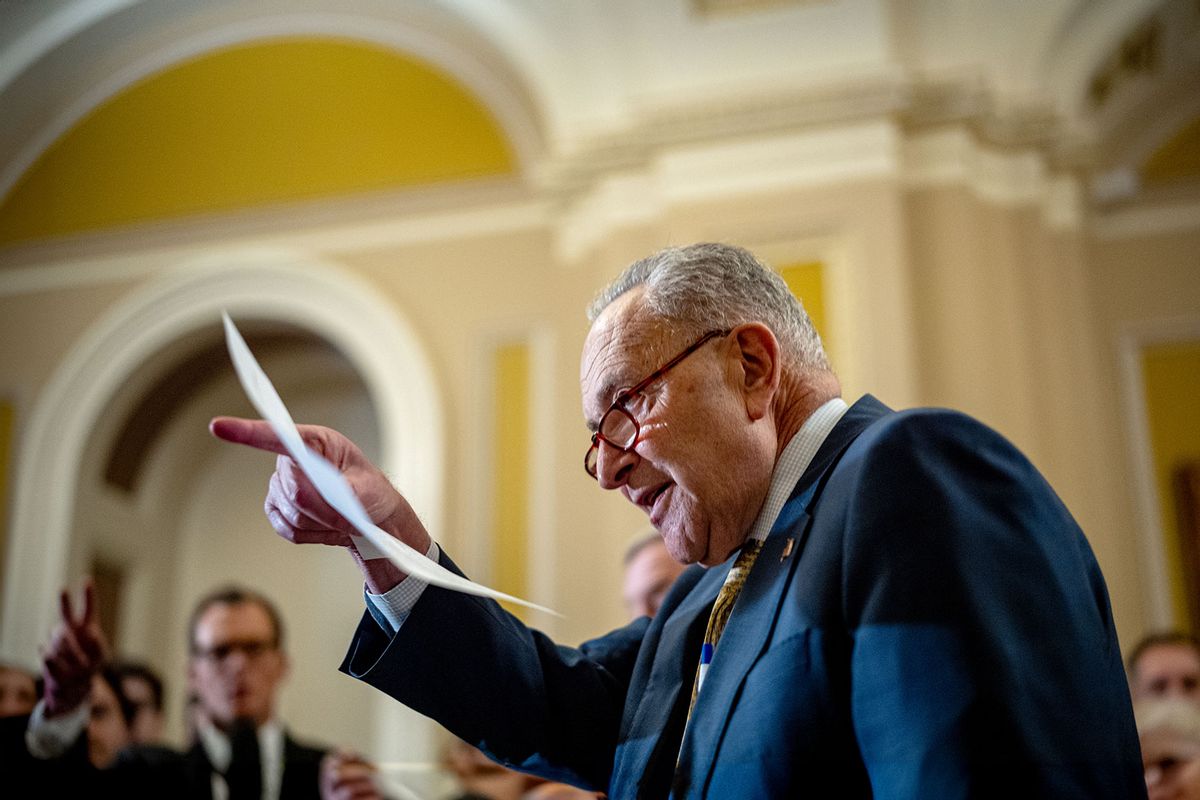Legal advocacy groups on Friday accused Sen. Chuck Schumer, D-N.Y., of preemptively surrendering to Republicans with the deal he cut late Thursday night, which would forfeit four Democratic circuit court nominees in order to prioritize 13 district court nominees, further ceding appellate court appointments to Republicans.
According to the Associated Press, the deal outlines a plan for the Senate to vote to confirm 13 more district court judges before the upper chamber adjourns in December. If the Senate votes to confirm all of these nominees, President Joe Biden will have successfully appointed 234 judges to federal courts — the same number of judges that President-elect Donald Trump appointed in his first term.
As part of the deal, Republicans have agreed to the schedule. Previously, they were forcing procedural votes in order to slow down the confirmation process.
The issue with the deal, however, is that all of the judges will be district court judges rather than circuit court judges, meaning that Republicans will likely get to appoint the replacements for the four pending vacancies on the circuit court level, potentially giving Republicans even more control over the federal judiciary on the appellate level.
News of the deal was met with immediate criticism from groups like the American Constitution Society and its president, former Sen. Russ Feingold, D-Wis., who told Salon that “it is extremely frustrating to hear the reported deal on circuit court nominees.”
“The White House has nominated extremely qualified individuals for these seats and the Senate needs to do its job and hold votes on all of these nominees,” Feingold said. “All public officials need to be prepared to fight against the extremism that will come when Trump returns to office and retreating in advance is a dangerous precedent to set.”
There are currently four circuit court nominees awaiting a floor vote in the Senate: Adeel Abdullah Mangi, who was nominated for the Third Circuit; Karla M. Campbell, who was nominated for the Sixth Circuit; Julia M. Lipez, who was nominated for the First Circuit; and Ryan Young Park, who was nominated for the Fourth Circuit.
According to Feingold, the deal “paves the way for the incoming administration to install more conservative extremist judges on powerful courts of appeal, which in the past eight years have ruled again and again against the rights of Americans on issues ranging from reproductive freedom to voting rights. All of these lifetime appointments will affect our rights for generations to come.”
We need your help to stay independent
Maggie Jo Buchanan, the managing director of the liberal advocacy group Demand Justice, called the deal “categorically unacceptable.”
“These are critical seats that have real impacts on everyday Americans–we cannot allow Trump to fill them with radical extremists,” Buchanan said. “If Democratic Senators are already rolling over this easily while they still have power, we are in for trouble when Trump actually assumes office. We need leadership that’s up for a fight–and that starts now.”
Russell Wheeler, a senior fellow at the Brookings Institution, however, pointed out that two of the circuit court nominees, Campbell and Park, are for future vacancies, meaning the outgoing justices could decide to stay on the court through the next presidential election.
“There is precedent for them simply withdrawing their intention to leave senior status,” Wheeler said. “If this deal will get possibly 13 more district judges through I think it's all in all a good thing for the Democrats.”
Want a daily wrap-up of all the news and commentary Salon has to offer? Subscribe to our morning newsletter, Crash Course.
Wheeler also noted that there has been opposition within the Democratic caucus to Mangi’s nomination by both Democratic senators from Nevada, Jacky Rosen and Catherine Cortez Masto. Wheeler noted that, without inside information on how senators planned to vote on these circuit court nominees, it’s hard to know whether they might have been able to get them through or not.
Carl Tobias, a law professor at the University of Richmond, told Salon that it’s not clear whether Rosen and Cortez Masto, who are up for re-election in six and four years respectively, would have maintained their opposition of Mangi. The doubts about Mangi’s ability to get confirmed, combined with the two future vacancies “makes it look like a less bad deal.”
“What’s not clear to me is that none of those four nominees were going to be confirmed,” Tobias said. “The other Democrats who lost have all been there to vote, Tester, Brown, and Casey, and Manchin have been voting for some of the nominees as has Sinema.”
Tobias said that Mangi’s confirmation, in particular, could have been important in tipping the balance on the third circuit from Republican appointees to Democratic appointees.
“The only one who I think may not have gotten an affirmative vote is Mangi,” Tobias said. “But there's a big caveat to that. I wasn’t in the room when the deal was cut. I don't know what Democrats know and I don't know what Republicans know and a lot of that is not public information.”



Shares